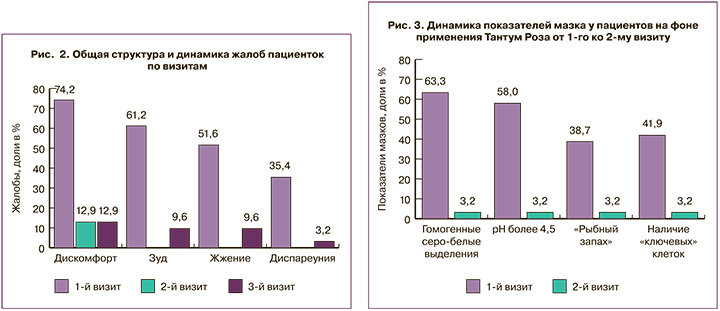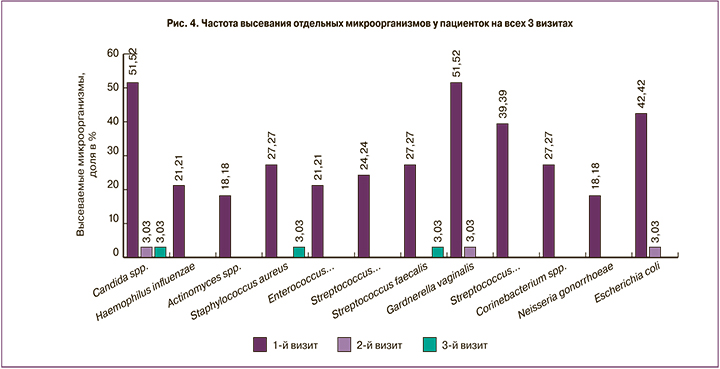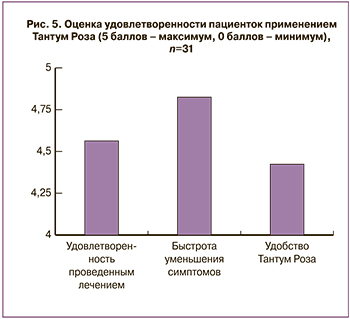В настоящее время в связи с изменением образа жизни (позднее вступление в брак, частая смена половых партнеров, неконтролируемый прием антибиотиков, стрессы) все чаще на прием приходят пациентки с жалобами на дискомфорт в области вульвы и влагалища, который ведет к социальной дезадаптации. Симптомокомплекс включает жалобы на зуд и жжение в области половых органов, диспареунию, патологические выделения из половых путей с неприятным запахом, а также изменение чистоты мазка. После обследования врач расценивает такие состояния, как кандидозный вульвовагинит, аэробный вульвовагинит или бактериальный вагиноз [1–4].
Тантум Роза на основе бензидамина является прекрасной альтернативой или существенным дополнением к основным схемам лечения данных заболеваний. Бензидамин – это нестероидное противовоспалительное средство, принадлежащее к группе индазолов, обладающее противовоспалительным и местным обезболивающим действиями, а также антибактериальными, противогрибковыми и антисептическими свойствами. Механизм действия препарата заключается в стабилизации клеточных мембран и ингибировании синтеза простагландинов. Антибактериальное действие обусловлено проникновением через мембраны микроорганизмов с последующим повреждением клеточных структур, в частности разрушением лизосом, а также нарушением метаболизма клетки. Бензидамин обладает противогрибковым действием в отношении Candida albicans, действуя на репродукцию грибковой клетки, – вызывает структурные изменения клеточной стенки грибов и их метаболических цепей.
К преимуществам данного лекарственного средства можно отнести форму выпуска препарата в виде раствора для спринцеваний влагалища. По сравнению с вагинальными свечами при применении раствора улучшается абсорбция через слизистые оболочки. Экскреция препарата происходит почками и через кишечник, таким образом, препарат не оказывает неблагоприятного воздействия на печень.
Тантум Роза не противопоказан беременным и кормящим женщинам и может применяться для лечения и профилактики послеродовых инфекционных осложнений.
Также стоит отметить, что готовый раствор Тантум Роза во флаконах имеет характерный приятный запах розы, что особо актуально для применения у женщин с жалобами на неприятный запах в интимной области. Поэтому применение готового раствора Тантум Роза у таких женщин оказывает благоприятное влияние на их психоэмоциональный фон.
Материалы и методы
В исследование была включена 31 женщина, средний возраст составил 32,34 (SD=6,66) года. Средний показатель индекса массы тела (ИМТ) составил 23,32 (SD=5,18) кг/м2.
Пациентки наблюдались амбулаторно и посещали врача 3 раза. В ходе исследования завершили все 3 визита 100% пациенток. Среднее значение для 2-го визита было 23,5 (SD=3,8) дня, для 3-го – 63,77 (SD=27,42) дня.
 Структура диагнозов включала кандидозный вульвовагинит, аэробный вульвовагинит, бактериальный вагиноз. Частота встречаемости диагнозов в выборке представлена на рис. 1.
Структура диагнозов включала кандидозный вульвовагинит, аэробный вульвовагинит, бактериальный вагиноз. Частота встречаемости диагнозов в выборке представлена на рис. 1.
Далее анализировали изменение частоты предъявляемых пациентками жалоб на всех 3 визитах.
Результаты
Дискомфорт на 1-м визите испытывали 23/31 (74,2%) пациентки, на 2-м визите – 4/31 (12,9%), на 3-м – также 4/31 (12,9%) (p=0,001). Зуд на 1-м визите испытывали 19/31 (61,2%) пациенток, на 2-м визите – ни одной пациентки, а на 3-м визите данный симптом отмечали 3 пациентки (р=0,008).
На жжение в области половых органов на 1-м визите жаловались 16/31 (51,6%) пациенток, на 2-м визите ни одна пациентка не испытывала данного симптома, а на 3-м визите – 3 пациентки (р=0,006).
Диспареуния на 1-м визите встречалась у 11/31 (35,4%) пациенток, ко 2-му визиту жалоб на данный симптом не было, на 3-м визите – отмечалась у 1 пациентки (р=0,009).
Общая структура и динамика жалоб пациенток по визитам представлена на рис. 2.

Помимо жалоб, оценивалась и частота возникновения, а также последующая динамика характера патологических выделений. Так, на 1-м визите они отмечались у 28/31 (90,3%) пациенток, на 2-м визите – у 1, а на 3-м визите – у 6.
При этом на фоне применения бензидамина отмечается выраженная положительная динамика ко 2-му визиту относительно гиперемии слизистой, а также выраженности эктопии шейки матки. На 1-м визите они отмечались у 20/31 (64,5%) и у 22/31 (70,9%) пациенток, а ко 2-му визиту всего у 2/31 (6,4%) и у 5/31 (16,1%) пациенток.
При осмотре оценивали характер выделений: у 10/31 (32,2%) пациенток на 1-м визите отмечали выделения «с рыбным запахом», в то время как ни у одной из пациенток они не выявлены на 2-м визите (р=0,000). Творожистые выделения на 1-м визите были у 13/31 (41,9 %) пациенток, и ни у одной пациентки их не было на 2-м визите (р=0,000).
Клиническое значение также имеют результаты микроскопического исследования мазка на флору. При бактериальном вагинозе они характеризовались наличием гомогенных серо-белых выделений, рН>4,5, с «рыбным запахом», наличием «ключевых» клеток. Отмечается выраженная положительная динамика на фоне применения Тантум Роза у таких пациенток от 1-го ко 2-му визиту. Данные по динамике показателей мазка представлены на рис. 3.
Так как рассматриваемые в исследовании заболевания являются инфекционными, то клиническое значение для оценки антимикробного действия бензидамина характеризуется динамикой выявления отдельных микроорганизмов (представлена на рис. 4) на основании образцов, полученных от пациенток на каждом из визитов.

Данные говорят о выраженном снижении концентрации и встречаемости условно-патогенных микроорганизмов на фоне применения бензидамина.
 Кроме того, по истечении 30–60 дней после лечения оценивали частоту возникновения рецидивов тех состояний, с которыми изначально обращались пациентки. Случаи рецидивов были отмечены у 5 женщин, что составило примерно 15% от общей выборки. При анализе причин, которые могут способствовать возникновению рецидива, в 100% случаев было отмечено наличие провоцирующих факторов. У 2/5 пациенток это был незащищенный половой акт, еще у 2/5 пациенток был сопутствующий инфекционный процесс, потребовавший применения системных антибиотиков, у 1/5 пациенток был перерыв в курсе применения Тантум Роза. Таким образом, в проведенном наблюдательном исследовании не было зафиксировано самостоятельно развившихся рецидивов без провоцирующих факторов.
Кроме того, по истечении 30–60 дней после лечения оценивали частоту возникновения рецидивов тех состояний, с которыми изначально обращались пациентки. Случаи рецидивов были отмечены у 5 женщин, что составило примерно 15% от общей выборки. При анализе причин, которые могут способствовать возникновению рецидива, в 100% случаев было отмечено наличие провоцирующих факторов. У 2/5 пациенток это был незащищенный половой акт, еще у 2/5 пациенток был сопутствующий инфекционный процесс, потребовавший применения системных антибиотиков, у 1/5 пациенток был перерыв в курсе применения Тантум Роза. Таким образом, в проведенном наблюдательном исследовании не было зафиксировано самостоятельно развившихся рецидивов без провоцирующих факторов.
Также важна оценка со стороны пациенток, которым было проведено лечение с применением Тантум Роза. Средние результаты баллов по удовлетворенности лечением, быстроте уменьшения симптомов и удобству применения Тантум Роза представлены на рис. 5. Баллы рассчитывали, исходя из ответов всех пациенток, где 5 баллов – максимальная удовлетворенность, а 0 – отсутствие удовлетворенности.
Заключение
Таким образом, наш опыт применения Тантум Роза на основе бензидамина, обладающего как антимикробным, так и противовоспалительным и обезболивающим действиями, продемонстрировал терапевтическую эффективность при лечении кандидозного и аэробного вульвовагинитов и бактериального вагиноза. Эффективность подтверждена по всем общепринятым критериям оценки: объективного осмотра, микробиологических исследований, удовлетворенности пациенток. Субъективно отмечена быстрота действия данного препарата на симптомы интимного дискомфорта: патологические выделения, зуд и жжение. Объективно отмечена выраженная положительная динамика регрессии гиперемии и отека тканей, по лабораторным показателям – элиминация патогенов и нормализация микрофлоры влагалища.
Кроме того, после лечения мы не наблюдали истинные рецидивы заболевания в течение 30–60 дней после санации.
Рекомендуется внедрение препарата в рутинную клиническую практику акушеров-гинекологов ЛПУ как средства выбора или части комбинированной терапии для лечения бактериального вагиноза и вульвовагинитов различной этиологии.



